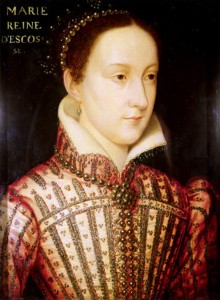 On this day in history, on 19th August 1561 at six o'clock in the morning, Mary, Queen of Scots landed at Leith harbour, in Scotland, the country of her birth. The reason for her return to her homeland was the death of her husband, Francis II, King of France. He had died in December 1560 and was succeeded by his brother, Charles IX, with his mother, Catherine de' Medici acting as regent for the ten-year-old boy. Mary knew that there was no sense in her staying in France. There was no place for her there, so she handed her jewels in to Catherine and set about planning her return to Scotland and making a fresh start.
On this day in history, on 19th August 1561 at six o'clock in the morning, Mary, Queen of Scots landed at Leith harbour, in Scotland, the country of her birth. The reason for her return to her homeland was the death of her husband, Francis II, King of France. He had died in December 1560 and was succeeded by his brother, Charles IX, with his mother, Catherine de' Medici acting as regent for the ten-year-old boy. Mary knew that there was no sense in her staying in France. There was no place for her there, so she handed her jewels in to Catherine and set about planning her return to Scotland and making a fresh start.
While she was planning her return, she received a visit from Sir Nicholas Throckmorton and the Earl of Bedford, who had been sent by Elizabeth I to get Mary to ratify the Treaty of Edinburgh. Mary refused, pointing out that she was "without counsel". William Cecil, Elizabeth I's primary adviser, saw Mary's refusal as a hostile act and a refusal to accept Elizabeth as England's rightful ruler. It seemed to him that Mary was going to cause trouble.
Scotland, too, was wary of Mary's planned return. There had been a revolt in 1559-60 against the regency of Mary's mother, Mary of Guise, which resulted in her deposition. Mary was briefed on this by Henri Cleutin, Seigneur d'Oysel, her mother's former chief lieutenant, and advised to give her support to Lord James Stuart, her illegitimate half brother. D'Oysel knew that he was the only one who could hold the Scottish Lords together.
Mary, Queen of Scots left the port of Calais on 14th August, and as her galley left the harbour, a ship collided with another vessel and sank, drowning all of its crew. Mary worried that this was a bad omen. She broke down and burst into tears as the French coast disappeared from view, saying "Adieu France. It's all over now. Adieu France. I think I'll never see your shores again."
Also on this day in history, 19th August 1551, Princess Mary, the future Mary I, wrote to her brother Edward VI regarding the instructions the officers of her household were given about forbidding her chaplains to say Mass and any of her household to hear Mass - click here to read more.
(Extract from On This Day in Tudor History by Claire Ridgway)


Leave a Reply